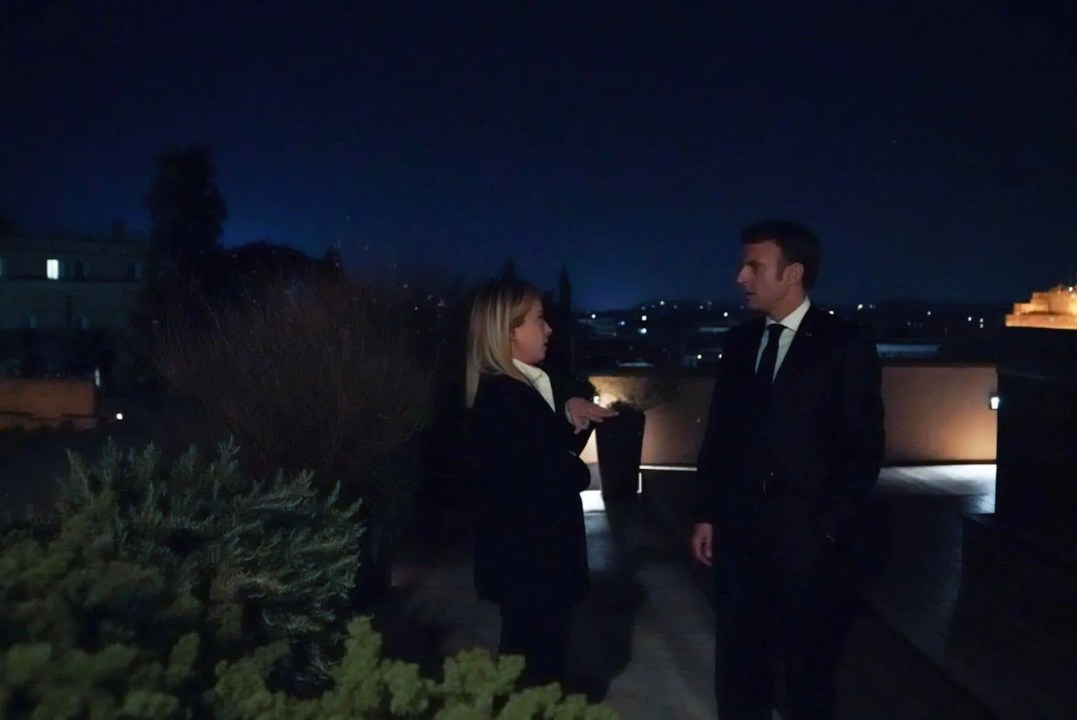One in four Italians who voted at last month’s election backed Giorgia Meloni’s conservative Brothers of Italy party – that is 7,302,517 men and women. Second in the general election was the centre-left Democratic party with 5,356,180 votes with 19 per cent. In other words, Meloni’s victory was resounding. Coming as it did after the brief premiership of the unelected Mario Draghi one might even call it a victory for democracy.
Yet the western reaction to Italy electing its first female prime minister was overwhelmingly cold and aloof. The Prime Minister of France, Elisabeth Borne, for example, promised to keep a close eye on Meloni to ensure she respected Italy’s human rights because ‘in Europe we carry a certain number of values’ which include ‘respect for each other’.
Emmanuel Macron was more discreet in his response, saying that he ‘respected’ the choice of the Italian people. On Sunday he became the first head of state to congratulate Meloni in person. He did so without fanfare, and there was no official photograph of the discussion, other than a snapshot of the pair released on Macron’s official Twitter account.
The tête-à-tête lasted an hour and encompassed the energy crisis, the war in Ukraine, defence and Europe’s migrant crisis. ‘It was supposed to be a quick coffee and it turned into a long and cordial conversation with a clear convergence of views on the main European issues,’ said a Meloni aide.
One of Macron’s advisors said the discussion had been ‘frank’ and the president himself remarked in a tweet: ‘As Europeans, as neighbouring countries, friends, we must continue with Italy all the work we have begun. We owe it to our youth and our peoples to succeed together.’
Such pragmatism has been the hallmark of Macron’s presidency in recent months. In July, he hosted Saudi Crown Prince Mohammed bin Salman for dinner at the Elysée. In September, he met Iranian President Ebrahim Raisi in New York – the energy crisis was at the heart of both discussions.
The encounters provoked criticism in some quarters, mainly from human rights organisations, but it was mild compared to the furore that erupted in France after Macron dared to meet Meloni.
Green MP Sandrine Rousseau accused the president of ‘indulging fascism’ and said that in meeting Meloni he was ‘collaborating with regimes that trace their history to Mussolini’. Mussolini was also referenced by Boris Vallaud, the parliamentary president of the Socialist party, while his far-left La France Insoumise counterpart, Mathilde Panot, condemned Macron for ‘running to talk to Italy’s fascist leader’.
Green MP Benjamin Lucas went further, likening the moment Macron met Meloni to one of the darkest moments in French history: ‘On 24 October 1940, in Montoire, a handshake between Pétain and Hitler marked the beginning of the Collaboration,’ he thundered. ‘Let this memory haunt us, obsess us, and lead us to constantly refuse to accept the trivialisation of fascism wherever it is found.’
The immaturity of such remarks is dispiriting. It exposes the intellectual shallowness and dishonesty of some of those on the French left. It also smacks of hypocrisy given that in recent years it is the left in France who have faced accusations of antisemitism.
Meloni is also a committed ally of Ukraine, as she reiterated in the Italian parliament in a speech on Tuesday, while much of the French left has been ambiguous as to where its support lies. One of its figureheads, Jean-Luc Melenchon, said as recently as December that Russia was ‘not an enemy but a partner’.
The left also ignores the gravity of the situation in France. Immigration is out of control and the terrible consequences are being felt every week around the country, as I described last week.
Macron acknowledged the extent of the crisis in a television interview on Wednesday evening, stating that half of the crimes committed in Paris are by ‘foreigners, either in an irregular situation or awaiting permits’. However, he also claimed there was no ‘existential link between immigration and insecurity’, which left many, among them Marine Le Pen, incredulous.
A new immigration bill will be tabled in the new year, driven by the interior minister Gérald Darmanin, who is expected to run on a centre-right ticket in the 2027 presidential election. He talks tough on immigration although his actions have yet to match his rhetoric, but that may be because hitherto he’s had only lukewarm support from his president. Whether Macron follows through on his vow to thoroughly reform the system to make it easier to expel illegal immigrants will be seen in due course.
The western reaction to Italy electing its first female prime minister was overwhelmingly cold and aloof
In her speech to the Italian parliament on Tuesday, Meloni was more specific in how she wants to bring order to the EU’s chaotic immigration system. The best solution to end what she described as ‘human trafficking’ in the Mediterranean is ‘to prevent the departure, not the arrival’.
When Nicholas Farrell interviewed Meloni for The Spectator two months ago she stated that ‘Europe must strike a deal to stop the departures and open up hotspots in Libya to process asylum requests’. Genuine asylum seekers should be distributed fairly across Europe and economic migrants should be rejected. ‘Borders exist only if you defend them,’ she told Farrell.
It was a message that resonated with Italians. They voted for Meloni not because she or they are fascists but because they want more of a say on who enters their country and how many. The French want the same thing. If the left can’t see that then they will remain out of power for years to come.







Comments